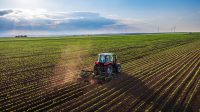The Farming Financial Planning Guide

10th January 2022
-
Stuart Coombe See profile
The building blocks of financial planning are similar across many sectors, but for rural businesses, it’s often a complex activity which is subject to unique considerations and nuances. However, while financial planning in these circumstances faces specific challenges, there are steps that farming businesses and their advisers can take to make the most of the opportunities available.
Every business will have its ups and downs, but the wildly varying income seen in the farming sector makes longer-term planning difficult. Most businesses can estimate the value of their output, but farming is unique in lacking control over this, and certainty is a rare thing in rural circles.
Avoid using personal funds
Cash flow can get very stretched, and the ability to store wealth ‘off-farm’ can be sporadic, so it’s essential to try and instil discipline in the good years, and – as far as possible – set clear boundaries between personal and business funds. Personal funds are frequently lent to farming businesses, often without any likelihood of being paid back. This can cause issues further down the line. For example, when older generations try to extract the capital needed to fund expenses such as retirement or care fees.
Invest for the long-term
Most farmers are self-employed, so relying on an employer to set up a pension is not an option. Wages can also be low, especially where families are involved, or other benefits such as housing make up part of the remuneration, making it very difficult to save. It’s also common to hear farms described as ‘money pits’ or ‘black holes’, such is their ability to draw all available capital into them. Therefore, trying to prise funds away (at the earliest stage possible) to invest for the longer-term is crucial.

Protecting against your borrowings
Rural businesses require substantial financial and emotional commitments. Working overdrafts often run well into six figures, and borrowing at what could be considered eye-watering levels is common. Protecting against these borrowings is crucial, to sustain the business in all eventualities; however, working in the countryside and undertaking manual farm duties is riskier than most careers, and protection premiums will reflect this.
"Retiring away from the farm can lead to a spike in outgoings"
Use Self-Invested Personal Pensions (SIPPs) and Small Self-Administered Schemes (SSASs) for your retirement planning
The most commonly recurring planning themes are in connection with retirement and succession. Unlike salaried employees who have a set retirement date in mind, farmers usually stay working for longer, and with no clear line between work and retirement.
We find that many farmers don’t know when they would like to retire, whether they still want to retain an interest in the farming business, and what kind of retirement income they will need, which will vary depending on their final decision. If they remain part of the farm, for example, some of their income costs may be borne by the business. Retiring away from the farm can lead to a spike in outgoings and a need for additional income.
However, farmers are often very entrepreneurial and keen to explore areas that would not always be of interest or appropriate to others. More complex pension structures, and considering the suitability of land or commercial buildings within a SIPP or SSAS wrapper, can be useful strategies for the right families.
Succession planning also provides challenges for farming enterprises. Although rules regarding the availability of agricultural and business property relief have tightened significantly, with the right tax advice, rural businesses can still maximise the Inheritance Tax (IHT) reliefs available.
But if there are no successors and the farming business decides to sell up, or if the land or assets do not qualify for these reliefs, IHT can become a huge issue. With average farmland prices at around £9,000 an acre, even modest-sized farms can be worth substantive sums that the current nil rate bands will not come close to covering. Often the residence nil rate band can be in jeopardy as the value of an estate (before reliefs) can creep over £2 million. In such cases, getting expert advice as early as possible can be the key to mitigating the IHT burden.
Equalising legacies where one child will inherit a farm with very high capital value is also a particular situation where it may be worth considering gifting, whole of life plans or other relevant strategies.
"Financial planning for rural businesses is often complex and subject to unique considerations."
We work in conjunction with other professionals to provide you with a joined-up approach to tax and financial planning. Our role as a financial planner is to assess the situation once you have a clear picture, and to advise you on any remedial action.
If you would like expert advice from one of our specialist rural financial planners, do get in contact.

